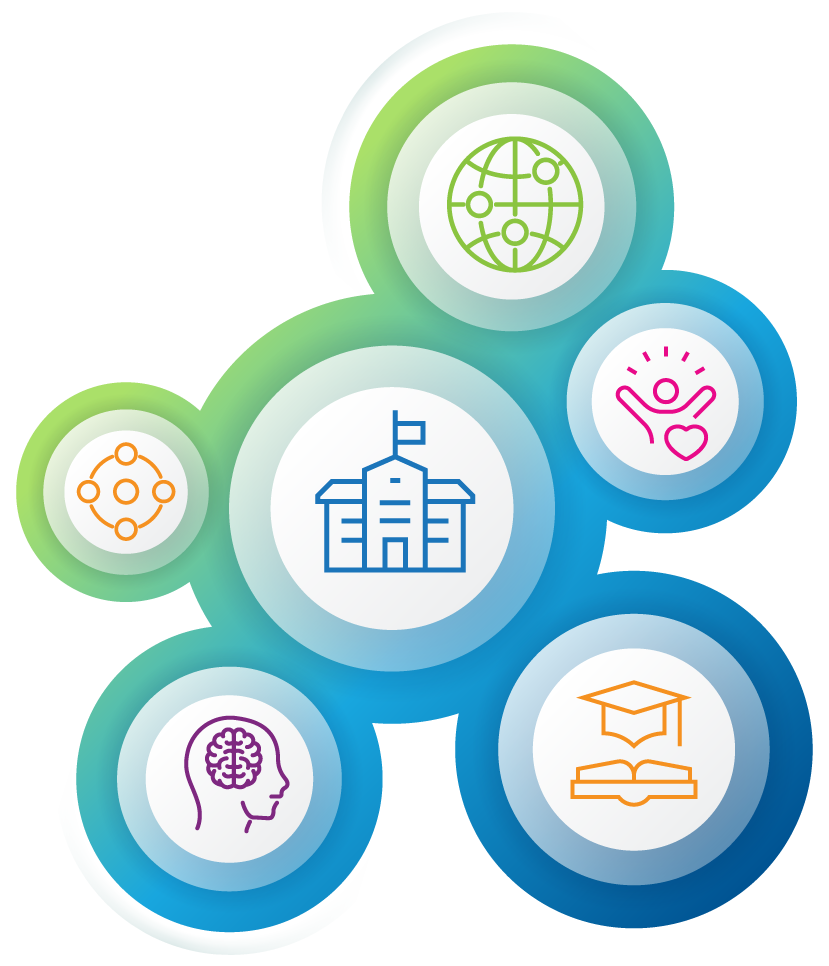
A variety of parallel workshops on relevant topics will be offered each day and presenters will share insights and leadership expertise that
- address key questions and issues in educational leadership
- provide actionable strategies for school leaders and
- showcase diverse perspectives and innovative approaches.
Participants will choose their preferred workshop on the day of the event. There is no pre-selection or advance registration for workshops. Seating is limited and available on a first-come, first-served basis until the room reaches capacity. Please go directly to your chosen workshop room at the scheduled time.
For more information on the schedule and room assignments:
Themes

-
Community and Relationship-Based Engagement
-
Equity, Inclusion and Anti-Oppression
-
Inclusive and Supportive Instructional Practices
-
Indigenous Learning
-
Leadership Development and Coaching
-
System and School Improvement
-
Well-Being and Resilience
Parallel Workshop Schedule
| Block | Date | Time |
|---|---|---|
| 1 | November 13 | 2:45 p.m. to 4:00 p.m. |
| 2 | November 14 | 10:45 a.m. to 12:00 p.m. |
| 3 | November 14 | 1:15 to 2:30 p.m. |
Block 1 - Thursday, November 13 (2:45 - 4:00 p.m.)
| Beyond the Bake Sale:
Reimagining Parent Engagement in Ontario’s Diverse Communities |
|
Theme: Community and Relationship-Based Engagement In today’s diverse school communities, traditional approaches to parent engagement may not always be effective. This interactive and reflective workshop will explore innovative, culturally responsive strategies to build meaningful partnerships with families. Participants will examine common barriers—such as language, cultural differences and systemic challenges—and discover practical ways to foster trust, communication and collaboration. Through case studies, interactive discussions and action planning, principals and vice-principals will gain the tools to create inclusive engagement practices that reflect the realities of their school communities. The participants will leave with strategies to strengthen family-school relationships, enhance student success and build a more connected school environment. Kulbir K Singh, Vice-principal, Peel District School Board |
| Creating Brave Spaces:
Breaking Stereotypes and Removing the Barriers of Colonization |
|
Theme: Equity, Inclusion and Anti-Oppression This interactive workshop will equip participants with the knowledge and tools to create “brave spaces” that actively challenge stereotypes and help decolonize classrooms and schools. There is a distinct difference between safe and brave spaces. Safe spaces are never guaranteed, and are difficult to create and maintain. A brave space, however, supports individuals to be themselves. Brave spaces are created at the micro-level and flow upward (classrooms and schools to the board level and community), while safe spaces are imposed downward from the board, to the school and then to classrooms. Participants will learn to create a space that boldly addresses systemic barriers, promotes inclusivity and fosters courageous dialogue that breaks down harmful stereotypes rooted in colonial narratives. This workshop will be delivered by two diverse individuals from distinct equity-seeking groups. Kimberly Elmer, Vice-principal, Ottawa-Carleton District School Board Dr. Rohan Hollingsworth, Vice-principal, Ottawa-Carleton District School Board |
| On Listening |
|
Theme: Community and Relationship-Based Engagement We tend to think of conversations as primarily acts of speech, as an exchange of words. But they are equally acts of listening. This workshop aims to develop our capacity to listen—even to things we do not want to hear. Through a series of exercises, we’ll consider the role of silence, sharpen our receptors to detect subtext and discover strategies for building and maintaining trust, which is critical to advancing difficult conversations. Ian Williams, Canadian Poet and Fiction Writer/ English Professor, University of Toronto |
|
Unlocking Inclusion: How School Leaders Can Create Inclusive Spaces for Muslim Students |
| Theme: Equity, Inclusion and Anti-Oppression
Muslims have been part of Canada’s history since before Confederation, yet many school communities know little about Muslim students and families. Why does this knowledge gap exist and how can school leaders bridge it to foster truly inclusive learning environments? This workshop will explore the why behind the need for inclusive practices to support Muslim students. Topics will include
Through interactive discussions, case studies and practical strategies, principals and vice-principals will gain the tools to better engage with Muslim families, challenge biases and create welcoming school cultures. As leaders in education, principals and vice-principals have a responsibility to ensure all students feel valued and respected. This workshop will provide actionable insights to help build more inclusive schools that reflect the diversity and rights of all students. Qaiser Ahmad, Administrator, Toronto District School Board
|
Block 2 - Friday, November 14 (10:45 a.m. - 12:00 p.m.)
|
Breaking Barriers: Understanding and Addressing Poverty in Schools |
|
Theme: Inclusive and Supportive Instructional Practices Poverty profoundly impacts students’ academic success, well-being and long-term opportunities. This workshop explores how societal structures, government policies and class systems influence educational inequities and provides practical strategies for school leaders that create meaningful change for economically disadvantaged students. Participants will engage with practical strategies they can implement to create equitable learning environments, foster resilience and advocate for systemic change, while also discussing the real-world challenge of balancing leadership responsibilities with daily demands. Mark Flumerfelt, Retired principal, Thames Valley District School Board |
| Data Principal:
Lifting Voices for Equitable School Improvement |
|
Theme: System and School Improvement In today’s schools, meaningful change begins with understanding the lived experiences of students, staff and families. This is a professional development workshop designed to equip principals with the skills and strategies to conduct effective listening workshops that elevate diverse voices within the school community. Participants will learn how to gather qualitative insights, analyze themes and use feedback to inform decision-making that improves student learning, well-being and connection. Through practical frameworks, real-world examples and interactive discussions, principals will leave with actionable tools to foster a culture of trust, inclusion and continuous improvement. This workshop will empower leaders to move beyond surface-level data, ensuring that what truly matters drives meaningful change in their schools. Alicia Lewis-Brown, Principal, Durham District School Board Dr. Joseph Wrigley, Principal, Durham District School Board |
| Happy Staff, Happy Students |
| Theme: Well-Being and Resilience
New realities in education include decreasingjob satisfaction, jobs that are tough and exhausting, staff shortages at an all-time high and staff happiness at an all-time low. This workshop will present principals and vice-principals with some simple staff meeting activities, Professional ActivityDay team-building strategies, staff spirit week outlines and easy ways to bring more staff engagement and fun into the school with the understanding that happier staff create happier classrooms and ultimately happier students. This workshop will provide principals and vice-principals with ready-to-implement strategies and activities to increase staff retention, improve communication, build upon teams and make work a place people want to be. Megan Egerton, Principal, Ottawa-Carleton District School Board |
| Leading Ourselves in Order to Lead Others |
|
Theme: Leadership Development and Coaching This workshop will provide time for leaders to connect with themselves and their own mental health and wellness using a variety of strategies and realistic tools to reflect, learn and take action to balance their work with personal lives. When we can start with ourselves as leaders, it helps us to authentically lead others. This workshop will touch on the challenges, roadblocks and sometimes the barriers that arise when trying to lead a mentally well school. Michelle Sigmann, Principal, Durham District School Board |
|
Leading with Heart: Effective Instructional Leadership Through an Indigenous Lens |
|
Theme: Indigenous Learning This workshop explores instructional leadership grounded in Indigenous ways of knowing, being and doing. Rooted in relationality, shared responsibility and holistic education, effective leadership extends beyond administration to fostering community, well-being and student success. Participants will examine how Indigenous values—such as interconnectedness, humility and respect—inform leadership practices that inspire meaningful learning environments. Drawing from the Indigenous leadership framework, this workshop will highlight the importance of mentorship, storytelling and land-based education in guiding educators and students. Leaders will reflect on their roles as administrators and advocates for culturally responsive learning. Practical strategies will be shared to support Indigenous and non-Indigenous educators in decolonizing leadership models, strengthening relationships and honouring Indigenous pedagogies in schools. Join us to explore how instructional leadership, when viewed through an Indigenous lens, nurtures identity, resilience and lifelong learning for all. Liv Rondeau, Vice-principal of Indigenous Education, Limestone District School Board |
Block 3 - Friday, November 14 (1:15 - 2:30 p.m.)
| Creating Change through Relationships |
|
Theme: Community and Relationship-Based Engagement Administrators’ work is always a balancing act, from school board policies, to Ministry mandates, to the well-being of staff and students. Leading change in a school is a true art form that requires balancing multiple leadership frameworks. One of the greatest lessons is leveraging relationships and humble conversations to improve teaching practices. For this workshop, participants will engage in helpful and purposeful dialogue around leveraging one of the greatest pieces of these frameworks, that of relationships. The workshop will include discussions about strategies that centre the power of relationships to move and monitor instructional change. Participants are encouraged to bring their School Improvement and Equity Plans (SIEP) goals to work on refining them for implementation. Jonathan So, Vice-principal, Peel District School Board |
| Human Centered Design for School Improvement |
|
Theme: System and School Improvement Human Centered Design is a people-centered approach to school improvement that many school and system leaders are turning to as a way of rethinking, redesigning and reimagining school curriculum, classroom spaces, school cultures and education systems. Human centered design is grounded in two fundamental beliefs.
Certified design thinking facilitators will guide participants through a practical approach that will deepen their understanding of the staff, students and community that school leaders serve to design and implement creative solutions that meet their needs. Participants will leave this interactive workshop with the knowledge and practical tools to lead a human centered design approach to school improvement. Sandy Millar, Principal, Waterloo Region District School Board Carli Parsons, Principal, Waterloo Region District School Board |
| Intentional Joy |
|
Theme: Well-Being and Resilience Discover the power of Intentional Joy in this dynamic and inspiring workshop designed for school administrators at any stage of their careers. Juggling endless to-do lists and high-stakes responsibilities often leaves little room for joy. This workshop offers a fresh approach, guiding participants to redefine priorities and make joy an integral part of everyday—even the busiest ones. Through reflective activities and strategic planning, participants will learn to sort and manage tasks effectively, delegate with confidence and identify moments of forgotten joy. Participants will leave with a personalized plan to weave joy into daily routines, empowered to lead with clarity, calm and renewed energy. This workshop is key to better wellness and stronger leadership for principals or vice-principals leading any size school. Rediscover joy and make every day feel a little less overwhelming—because a happier leader is a better leader! Kimberlee Johnston, Principal, Peel District School Board |
|
Sustaining Ourselves While Leading for Equity and Justice |
|
Theme: Equity, Inclusion and Anti-Oppression This session offers a heartfelt exploration of how to care for yourself while leading equity and justice work. Participants will examine the competing tensions school leaders navigate in this critical work and engage in a reflective discussion on aligning self-care with community care. The workshop will introduce leadership tools and strategies that support sustainable equity leadership, followed by a collaborative exercise on script-building—an immediately applicable skill for addressing challenging conversations in schools. Through rejuvenating dialogue and purposeful reflection, participants will renew their sense of purpose while gaining practical strategies to sustain their leadership. They will leave with actionable tools, including a quick-reference wellness planner designed for personal curation, helping them navigate the school year with greater balance and intention. Anjali Bajaj, Vice-principal, TDSB/AHINSA Leadership Collective |






 Subscribe to this Page
Subscribe to this Page